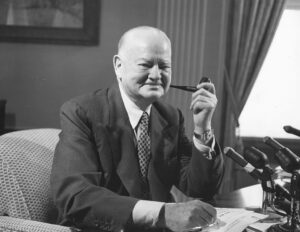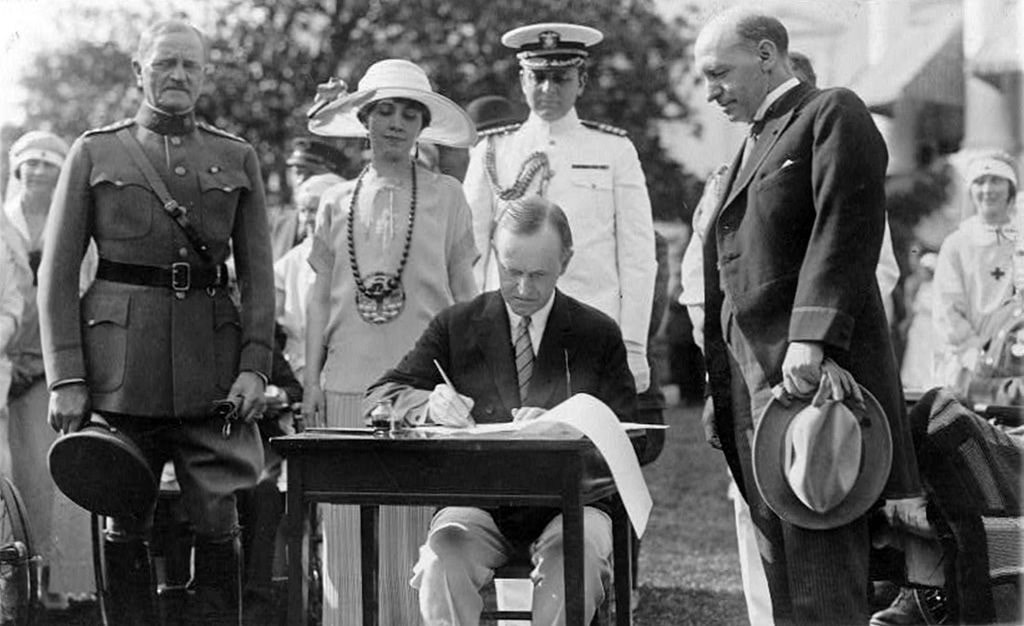The US electorate kicked off the Roaring Twenties by averting a bombardment of progressive possibilities. President Woodrow Wilson, the incumbent who foisted World War I and the Federal Reserve on the public, could not seek a third term due to his significant physical and mental disabilities. Former President Theodore Roosevelt died before he could accept a Republican nomination. Gov. James Cox (D-OH), a student of Woodrownomics, suffered defeat in the 1920 election. These events culminated in the presidencies of Warren Harding and Calvin Coolidge, two GOP leaders who would oversee one of the greatest economic periods in the nation’s history.
Warren Harding and the Roaring Twenties
Despite serving only a couple of years in the White House, Harding put together an exceptional record for economic historians to study. In March 1921, the United States was in the middle of a 14-month post-war decline, also known as the Forgotten Depression. The stock market crashed by 50%, corporate profits cratered by 90%, unemployment rose to nearly 12%, and the gross national product fell 6.9%. Harding was behind the eight-ball almost immediately, but this did not stop his presidency from ushering in the Roaring Twenties.
During his time in office, Harding signed legislation that slashed the top marginal tax rate from 73% to 25% and reduced or eliminated tax burdens for lower brackets. Treasury Secretary Andrew Mellon advocated for even lower tax rates, but Harding had to compromise with lawmakers. In addition to tax cuts, Harding punctured federal spending by as much as 66%, accounting for about 3% of the gross domestic product. The only government response to the 1920-21 downturn was an emergency tariff bill which promised in September 1921 that no federal money or legislation would be afforded to businesses.
The results? The annual GDP gains averaged above 5% during the decade, the jobless rate plummeted to around 2%, tax revenues climbed (thanks, Laffer Curve), and production boomed even with the eight-hour workday becoming commonplace. With fresh cash in hand and a limited government, Harding started paying down the national debt.
It was not only the economy where Harding excelled. He championed equal political rights for blacks, pardoned war opponents (socialists, too!), appointed economic conservatives to the courts, and engaged frequently with the public. Because of this record, it is safe to say that he would have easily won re-election if not for his heart attack in the summer of 1923 at the age of 57.
Coolidge Kept the Cool

Calvin Coolidge (Photo by: Photo12/Universal Images Group via Getty Images)
Vice President Calvin Coolidge became the 30th president and overwhelmingly won the 1924 election against Democrat John Davis and Progressive Robert La Follette. Despite ranking in the bottom half of US presidents by historians, he advanced free-market economics, civil rights, and small government. He essentially continued Harding’s crusade.
The Coolidge administration enjoyed several achievements that would be unheard of in today’s environment. He slashed income tax rates for the wealthiest 2% of taxpayers, abolished income levies for the rest of the nation, kept federal spending flat, and retired one-fourth of the national debt. Despite fierce lobbying, he refrained from supporting farm subsidies.
Like his predecessor, he advanced the civil rights of black Americans. However, he took a different approach to the immigration file, encouraging the public to tolerate differences, help immigrants, and abandon their prejudices. In addition, because of his indifference to world affairs and belief in US exceptionalism, Coolidge advocated a non-interventionist foreign policy.
If you were unaware of these details and now have fallen in love with Coolidge, you should read his statement to reporters about choosing not to run in the 1928 election: “If I take another term, I will be in the White House till 1933. Ten years in Washington is longer than any other man has had it – too long!” Some might think that Coolidge was a conservative (or libertarian) who should be the very model of a modern major Republican.
Wastin’ Away in Hooverville

Herbert Hoover (Photo by PhotoQuest/Getty Images)
Ugh. Herbert Hoover, the 31st president and Republican born in Iowa. Yay? Coolidge refrained from endorsing Hoover, remarking that “for six years, that man has given me unsolicited advice – all of it bad.” This reluctance was indeed justified as Hoovernomics was a dark period in history. Although historians contend that he championed the same laissez-faire principles as Harding and Coolidge and took a hands-off approach to the US economy, the reality was much different. In fact, according to some of the pioneers behind the New Deal, like economist Rexford Tugwell, Hoover’s policies were the inspiration behind President Franklin Delano Roosevelt’s response to the Great Depression.
The national economy was in some hard times in 1929 and 1930. However, after a year or two of Hoover’s expansion of the Leviathan and the implementation of government programs, the situation metastasized. Or, as libertarian historian Tom Woods described it, “the downturn-within-the-downturn.”
One of his first acts was the institution of price controls in the agricultural sector by propping up farm prices. This was unsurprising, considering that he had repeatedly recommended government assistance for farmers since the end of World War I as director of the US Food Administration and Commerce secretary. He would later raise tariffs by signing the devastating Smoot-Hawley Tariff Act, effectively raising taxes on the country. Hoover dramatically increased income tax rates on the public, bolstered surtaxes from 25% to 63% for high-income individuals, and announced new or higher taxes on corporations, automobiles, gasoline, electric energy, and telephones.
Nothing worked. But Hoover looked back at his administration with rose-colored glasses, telling the crowd in his 1932 Republican nomination acceptance speech:
“Two courses were open to us. We might have done nothing. That would have been utter ruin. Instead, we met the situation with proposals to private business and to the Congress of the most gigantic program of economic defense and counterattack ever evolved in the history of the Republic. We put that program in action.”
Big Government Wins
Although the Harding-Coolidge connection was red hot throughout the 1920s, not everyone shared this enthusiasm among the national electorate. Many states had adopted big government programs that countered the administration. And, of course, with the Great Depression entrenched in America’s consciousness, FDR’s enormous expansion of the federal government resulted in a long-term victory for the statists. Sure, there has been an ebb-and-flow trend in Washington for the last several decades, as some Republicans might trim the size and scope of the government which is then offset by an increase by Democrats. But the statists were the winners and have remained the victors for nearly a century. Overall, the magnitude of the US government will never return to what it was during the Roaring Twenties. All America has left of this bygone era is a Keep Cool With Coolidge button – a reminder of what government was before the statists took over.




